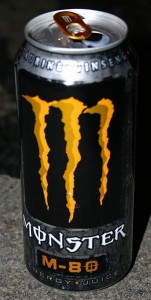 Rockstar, 5 Hour Energy, Redbull, Full Throttle, Monster and Amp — these products can be seen in students’ hands and vending machines all over campus.
Rockstar, 5 Hour Energy, Redbull, Full Throttle, Monster and Amp — these products can be seen in students’ hands and vending machines all over campus.
Energy in a can is now a common weapon for college students attempting to conquer late nights and final exams.
Students can finally see the end to the school year. Unfortunately, this also means more pressure on students struggling to find time to make ends meet before grades are final.
During this time of the year, it is not unusual to find students attempting to cram a semester worth of material in a few late-night study sessions, leaving students physically and mentally exhausted.
Many students may find themselves wishing they had more time and energy to focus.
With the promises of energy supplements to improve workday stamina and overall mental awareness, it is understandable for students to depend on the caffeine and sugar to get them through these last few weeks of school.
While these kinds of products will help keep students alert after a late night, it is likely to do more harm than good.
The energy drink industry is a growing market. Stop by any gas station or drug store and buy one of the hundreds of energy supplements available. The market is expanding because people want a quick and easy solution to a bigger problem.
While it is fine to take an energy shot once in a while to stay awake after a sleepless night, it is not fine to create dependence. Liquid energy is not a replacement for lack of sleep or deficient nutrition.
Where is the line between the occasional energy boost and dependence? Well, if a person is buying the six pack of 5 Hour Energy, there is a good chance his problem lies beyond the occasional drowsy morning.

If someone feels the need to knock back multiple energy drinks on a daily basis, he is most likely depriving his health, and no, the 8,000 percent of vitamin B12 is not a solid source of nutrition. It is also unnecessary.
B vitamins are water-soluble, meaning any amount consumed after the body has what it needs will simply get flushed out.
The most effective ingredient in most energy drinks is the caffeine. I am sure all the ginseng, taurine and other ingredients vaguely advertised on the label have some energy benefits, but caffeine is the stimulant affecting the brain.
The problem some people may encounter with caffeine is there is going to be an energy boost followed by an energy drop. This factor is what creates dependence and makes people reach for more and more when it comes to caffeinated beverages.
This is especially problematic when it comes to someone who drinks two cups of coffee in the morning and multiple teas or sodas before lunch. Add in an energy drink, and the caffeine amount could be way more than 600 milligrams.
Getting the blood pumping a little is fine, but that much caffeine causes raised heart rate, increased nervousness, insomnia and irritable bowels — not the ideal scenario before taking a final exam.
The average amount of caffeine in a cup of coffee or caffeinated beverage is between 100 to 200 milligrams.
Unfortunately, the FDA does not require producers of energy drinks to list exactly how much caffeine is in their products, making it even more difficult for consumers to keep track.
As mentioned before, it is OK to have the occasional energy drink, but it is not going to help someone who frequently loses sleep. In fact, drinking too much caffeine will only worsen sleeplessness.
Instead of replacing those last few hours of sleep with an energy drink, put down the textbook and go to bed. The brain functions better when it has had proper sleep, and no amount of caffeine will be able to compensate.
Also, carbohydrates are the body’s natural energy source, so do not skip out on breakfast before a final exam.
By BRITTANY POWELL
Profiles Editor
bripowel@ius.edu
